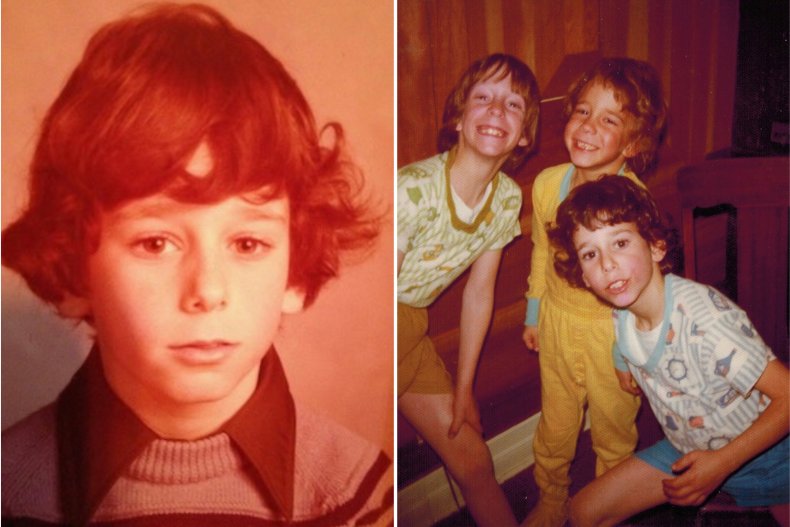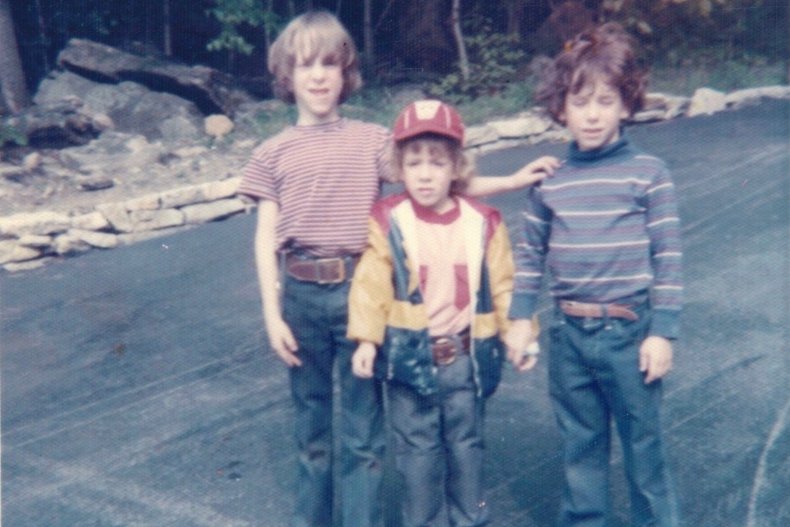Growing up, my household was fairly chaotic. I have two brothers, but my father wasn’t around much—to me, he was an ominous figure who wanted things done properly, all the time.
I sought escape in one way or another from an early age, which my mom tells me started with holding my breath until I turned blue and passed out. I sucked my thumb until I was nine or ten years old, and was always sleeping because I never wanted to stay awake.
At the age of 13, I tried alcohol for the first time. It was 1980 and my parents had re-decorated the house, including installing a home bar in the basement. They weren’t really entertainers—I remember them having one party—so the rest of the time, that basement was essentially a room for us kids to hang out in.
The bar was fully stocked and one day, after seeing those bottles day in and day out, I thought: Let’s try this.

Michael Eon
I tried alcohol on my own and immediately loved the feeling. Over the course of a few years, I exhausted all those bottles. If they were white liquor I filled them back up with water and if they were dark liquors, I filled them up with flat cola.
My parents never knew the difference and, after that, I drank whenever I could. I discovered marijuana early on, which led to trying other drugs including cocaine and psychedelics.
Essentially, I am an addict. I can’t stop using mind-altering substances when I have them, and when I don’t have them, I obsess over them. It was never enough—I was always chasing the numbness and the removal from reality.
I entered into a lifelong battle with addiction, fueled partly by working a high-pressure job in New York City. The industry was very stressful and meant working a lot of hours.
I always had a “work hard, play hard” mentality, where I tried my best not to let mind-altering substances or alcohol interfere with my ability to do the job, but after that bell rang, I would immediately drink to excess.
For me, it was almost like a ritual to cleanse myself after the day; to numb myself and to kill the pain. And I think that’s the case for a lot of people in that industry.
The first time I admitted I was an alcoholic was in 2002 at 35 years old. My career in New York City had become unbearable. I had been massively affected by 9/11. We had meetings in one of the Twin Towers a couple of days before the tragedy took place, which really impacted me.
The amount of liquor I drank increased over time as my disease progressed. During my days in New York, I did not drink during the day, but when I got out of work, I would stop at a bar and suck down six or seven Maker’s Mark Manhattans inside 20 minutes, before leaving for home.
The weekends would consist of a dozen or more liquor drinks—margaritas, Long Island iced teas, martinis or Manhattans—per day, until passing out.
My drinking spiraled out of control and, eventually, I walked into the chairman’s office and I said: “I’m an alcoholic and I need to step down and get help.” And that’s what I did.
I had grown up with the belief that asking for help was a bad thing. Often, if I didn’t know the answer to something I would get into trouble, but would be yelled at if I asked more questions. That led me to this place where I always believed in a weakness to rely on other people.

Michael Eon
This belief meant I had a problem with alcoholics anonymous (AA) from the beginning. My mind was in denial, telling me that it wasn’t for me. You’re not like these people. My brain was doing its best to try and rationalize and justify the situation.
I went to a few meetings and that was it. I told myself that I could do it on my own through sheer willpower. I built up this wall between me and alcohol, and for a few years managed to white knuckle it.
During that time I went back to school and got a master’s degree in international relations from Columbia University. I finished that degree without having a drink or taking a drug.
By this time I had two young kids and a wife. I didn’t want to start at the bottom in Washington, D.C. so I went into consulting and moved up to New Hampshire to get away from the rat race.
I thought I was escaping my problems, but throughout that entire period I was the same irritable, angry and hateful person. I wanted the world to fit me instead of fitting myself into the world as it is.
Of course, I relapsed. I began a three or four year spree of drinking that spiraled out of control.
Without any of what I considered to be meaningful professional responsibilities at the time, my drinking took off. By the time I hit bottom in 2009, I was drinking at least one entire liter bottle of whiskey a day and still functioning.
Somehow I got myself back into AA. At first, I fought everything—all the steps and the principles. I figured if I went to meetings and didn’t drink, like they told me, then I’d be fine. But again, I was that same discontented person.
I was sitting in a meeting when I heard someone say: “The real definition of insanity is joining a 12-step program and not doing the 12 steps.” That’s when I hit an emotional rock bottom.
I knew I had to ask someone to take me through the steps and see what happened. I needed to give into the fact that there’s this higher power I can have a personal relationship with if I just give it a chance.
I did the work, and it was the greatest thing that ever happened to me. It was life-changing.
I restarted my career in the entertainment industry, this time as a producer of film and television, an industry where substance abuse appears to be prevalent, but it’s not really talked about.
I feel it’s evident from scripts and screenplays where there’s alcohol, drugs or sex involved and it’s glamorized. In my eyes, it sends the wrong message. I feel that the portrayal of recovery or 12-step meetings is often not done well, and think there’s a long way to go.
I do believe that in a post-opioid epidemic world, people are coming to understand that addiction is a disease, not something that happens because a person has no morals.
For many addicts, if they could stop they would—because there comes a point in active addiction where you can’t live with it and you can’t live without it. And that is a rock bottom.
I believe addiction is a threefold disease; it’s mental, it’s physical and it’s spiritual, and it needs to be treated.
What I gained during this long term of emotional sobriety was unbelievable, but in 2015 I ended up injuring myself and getting hooked on painkillers and medicinal marijuana for a short period of time.
Luckily, I was able to get myself back to AA and have been clean for four years since that relapse. I fell right back into living by the principles of the program and doing the best I can to be useful.
Right now, I want to help as many people as I can, truly. But you have to want to change; I believe you have to get to a point of despair, where you can’t live with the substance, or without it.
Often, addicts are on a merry-go-round of hell every day. They wake up, swear off it but by 4 p.m. that day, they have what I call a built-in forgetter; all that misery from the morning just goes away and they’re back at it until they point they can’t do it anymore.
If you’re at that point, all I can say is there is help out there. I have taught my kids that if they ever get to that point, there is help and there is hope when you’re ready.
Michael Eon lives in New Hampshire with his family. His first novel, These Things Happen, is available on November 2, 2023.
All views expressed in this article are the author’s own.
As told to Newsweek’s My Turn associate editor, Monica Greep.
Do you have a unique experience or personal story to share? Email the My Turn team at myturn@newsweek.com.



